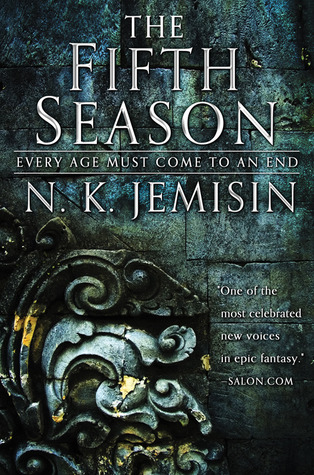To start (and to state my conclusion), this is a fantastic book with brilliant worldbuilding that confounds traditional characterizations of nature, government, allegiances and magic.
Nature is out to get you, vindictive and vengeful. The system uses gifted individuals like animals, their enslavement preordained and accepted by all as a part of the natural order of things. Selfishness and brutality are enshrined in a hybrid of law and religion known as stonelore, which also provides guidelines for the survival of a Season – a period of tectonic, volcanic upheaval that occurs when vengeful Earth makes her festering hatred for mankind felt.
Orogenes are the magic-wielders of this world. Capable of sensing and influencing the seismic activity around them. At once necessary and feared, they are able to cause and prevent the very thing everyone fears most – seismic activity. The Guardians control the orogenes, ruthlessly, keeping everyone safe through a form of indoctrination and partial enslavement of orogenes.
Being born an orogene is to be born into a life of self-hatred, knowing you represent all that everyone fears and that your society will kill you sooner than let you breathe the same air. The day your parents give you up to a Guardian, they will be happy to see the back of you.
People live in comms, communal arrangements akin to fortified villages, designed to survive the Seasons when they come. They do this by keeping out those who would steal the comm’s stockpiles and by ensuring limiting its members to those who can contribute, and never more than the comm is able to feed. This is considered a good thing. It is written in the lore.
Into this stable, accepted but somewhat unpleasant context, Jemisin pours her characters. We follow them through three separate timelines that interrelate in ways that gradually become apparent around the middle of the novel. Jemisin’s world is a rich tapestry cleverly and thoughtfully woven to provide a coherent and satisfying environment for the story. This is the greatest strength of the novel, in my opinion.
The story is the second strong point – there are actors and factions in significant number, although the main characters are kept to a disciplined minimum, allowing us to keep track of how we feel about each of them, and follow their desires, constraints and difficulties in great detail. These characters have roles, by which I mean they play a significant role that goes beyond their desire to satisfy their own needs – they have little choice in this, it follows them like a curse. A lesser writer would have written about prophecies, fate or destiny, but Jemisin describes the events, and we see the pattern ourselves for what it is.
The story leaves a lot unanswered, as befits the first book of a series, but I felt a comforting subplot was missing from the narrative – something that would provide at least a sense of resolution at the end of the book rather than a fairly long list of open questions that no doubt lead to further questions.
I had only one real problem with the novel, and that was with the relentless attention of the sexual oppression of the characters. There is not a single one who is not either in some way sexually oppressed, violated or abused, or either gay, bisexual, transgender, androgynous or cross-dressing. Most can tick at least one box from both lists.
While I applaud and encourage the inclusion of these elements into characters in novels, their omnipresence in The Fifth Season felt “shoehorned-in” by the final third of the book. A new character’s introduction at this point leads to a patient wait for the big reveal when they will turn out to have been raped as a child, to actually be the opposite gender I thought they were, or turn out to not be a gender at all, or a “Breeder” or a sexual surrogate or something. This isn’t a problem per se, but felt somehow cloying by the end of the book. It isn’t a function of, and doesn’t contribute to, the overall story, so it feels unnecessary. Perhaps I will get used to this by the next book and it will become part of the story and less of a distraction. I hope so.
This minor gripe aside, the world as built by Jemisin is a glorious landscape for the construction of a fantasy novel, a new take on magic and its presence and role in the world, and I look forward to the next installment. The broad recognition this book has garnered is well-earned.



